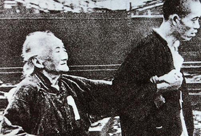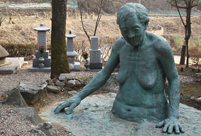 Fighters of Lanzhou MAC in confrontation training
Fighters of Lanzhou MAC in confrontation training
 3D printing to trigger third industrial revolution
3D printing to trigger third industrial revolution
 Top 10 brands that win rich women's hearts
Top 10 brands that win rich women's hearts
 Deng Xiaoping: 'I have a clear conscience all my life'
Deng Xiaoping: 'I have a clear conscience all my life'
 Xi Jinping: 'The people are our strength'
Xi Jinping: 'The people are our strength'
 Amazing cliff diving in cold winter
Amazing cliff diving in cold winter
 Enjoy Sochi 2014 in slow motion
Enjoy Sochi 2014 in slow motion
 University student sentenced to death for poisoning roommate
University student sentenced to death for poisoning roommate
 Chinese lunar New Year celebrated in San Francisco
Chinese lunar New Year celebrated in San Francisco
BEIJING, March 5 -- People across China observed a day for Good Samaritans by showing goodwill and lending a helping hand to strangers.
This year marks the 51st annual day of learning from Lei Feng, a soldier widely known in China for his generosity and altruistic deeds.
China's Ministry of Public Security on Wednesday honored a fire brigade from Lei Feng's hometown in central China's Hunan Province for its active involvement in charitable causes over the years.
The brigade, founded in 1978 and responsible for fire rescue in the provincial capital of Changsha, has provided financial aid to 43 impoverished students and 22 families. It has also donated goods and money worth 1 million yuan over the years.
In northwest China's Shaanxi Province, hearing-impaired students were given a "silent guide" to show them through a collection of ancient cultural artifacts on display at the Shaanxi History Museum in the provincial capital of Xi'an.
"These kids are very eager to learn, just like normal kids," said a sign language teacher surnamed Wu, who interpreted volunteers' explanations into sign language for the students.
The deaf children's school also signed an agreement on Wednesday with the museum for volunteer services that will let museum experts work as counsellors for the kids outside of school.
In northwest China's Xinjiang Uygur Autonomous Region, some taxis gave free rides to passengers on Wednesday as part of the city's annual campaign to promote the Good Samaritan spirit.
Some taxis drove senior citizens, the disabled, students and other needy people free of charge.
A growing number of taxis have voluntarily joined the campaign since it was first started in 2003. The free rides are also available during major Islamic celebrations.
Fifty years after Chairman Mao Zedong called on the nation to learn from Lei Feng, some Chinese have grown reluctant to offer a helping hand to others after several cases of people using scams to extort gains from Good Samaritans.
A survey on popular online portal Sohu.com asked netizens what they would do if they were to see an elderly person fall on the street. Among the 47,065 respondents, nearly one-third said they would not help for fear of being framed. A little more than seven percent said they would help only with witnesses around. Only 26.56 percent said they would help straight away. The rest said they were ambivalent.
The survey underscores the growing moral callousness in Chinese society that many experts say has been driven in large part by the lack of necessary protections for people who do good deeds.
Good Samaritans sometimes find themselves implicated in a premeditated scheme designed to extort financial gains.
Cases involving elderly citizens who claim that people who come to their aid are actually responsible for their injuries have chilled the public's enthusiasm for altruistic favors.
Chinese President Xi Jinping on Tuesday called for "concrete actions" by the country's volunteers to lend a helping hand and do their part for the needy, saying it would help to "make society better."
Some local governments have also provided cash rewards to encourage such deeds. There have been calls by experts to pass a Good Samaritan law to protect those who help against ill-intended schemes and punish those with ulterior motives.
 Chaihe village, pure and peaceful fairyland in snow
Chaihe village, pure and peaceful fairyland in snow Belgians warmly welcome arrival of China's giant pandas
Belgians warmly welcome arrival of China's giant pandas Female marines receive tactical training in NW China
Female marines receive tactical training in NW China Blood memory: Nanjing Massacre in 1937
Blood memory: Nanjing Massacre in 1937 Top 10 pure beauties in showbiz
Top 10 pure beauties in showbiz British WWII veteran: I can't forgive Japan
British WWII veteran: I can't forgive Japan Tongban's dream of prosperity
Tongban's dream of prosperity Chinese frigate Yancheng holds drills in Mediterranean Sea
Chinese frigate Yancheng holds drills in Mediterranean Sea A visit to comfort woman's home in South Korea
A visit to comfort woman's home in South Korea Fairyland? Qingdao in sea of clouds
Fairyland? Qingdao in sea of clouds Top 10 most handsome faces in Asia in 2013
Top 10 most handsome faces in Asia in 2013 Female celebs with beautiful long legs
Female celebs with beautiful long legs Cat 'guardians' in Forbidden City
Cat 'guardians' in Forbidden City Large numbers of ancient coins excavated in Inner Mongolia
Large numbers of ancient coins excavated in Inner Mongolia Leisurely life beneath Zhonggulou, where time travels slower
Leisurely life beneath Zhonggulou, where time travels slowerDay|Week|Month